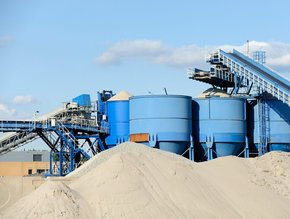Brexit, skills and innovation: The challenges and opportunities facing the UK construction industry

The UK construction industry continued to rebound in June, beating expectations with activity hitting a seven-month high.
After a snow disrupted April this is the third straight month of recovery in the construction industry, where housebuilding was once again the star performer, propping up the sector as civil engineering projects continued to hold back growth.
Yet the same survey which illustrates the construction sector putting the winter slump further behind it, also highlights concerns of the outlook ahead of Brexit. With so many uncertainties still linked to the UK leaving the EU, it is increasingly challenging for people or businesses to make any firm plans. This will only amplify as we move closer to Brexit should no deal be agreed.
See also:
- Comment: HS2 will define the future of the UK construction industry
- Balfour Beatty and Galliford Try pick up £235mn Carillion highway contracts
- US Army patents 3D printing solution for military-strength building construction
Up until now, growth of construction of residential properties has been a key driving force in the sector, government scheme such as help to buy, in addition to a slow improvement in financial conditions which continue to help lift demand.
Increased Brexit uncertainty as we move closer to the divorce date is likely to put the brakes on the demand side of this equation as confidence weakens and could slow down residential construction significantly. Given that this is currently one of the central pillars holding the sector up, the impact could be grave.
Costs are increasing. June saw the sharpest increase in input prices since September. Whilst inflation following the sharp fall in the pound after the Brexit referendum, is now working its way out of the system, it is unlikely that the pound at its current level is pricing in a hard, no deal Brexit. This means that a further fall in sterling is possible should there be no deal. If this is the case, we can expect input prices to be on the increase again. Furthermore, with shortages in skill and materials from the EU post Brexit costs can be expected to keep rising.
In times of difficultly innovation can often take a step forward. An increase in innovation and initiatives to drive change are already happening in the construction sector in order to try to meet demands and minimise costs. An increase in the use of technology and innovations in the areas of pre-manufacture and sustainability could contribute towards new construction methods.
Right now, the construction industry is holding up surprisingly well. However, with just eight months to go towards Brexit and significant uncertainties going forward the industry could find its star performer, residential construction under increasing pressure and costs all around rising. Continued innovation through technology could help address the skills shortage and increasing costs that are expected post Brexit.
By Fiona Cincotta, a senior market analyst at www.cityindex.co.uk
- Milestone hit on Australia’s Botany Rail Duplication ProjectConstruction Projects
- Renewables account for 79% of energy constructionConstruction Projects
- KPMG missed 'multiple red flags' in Carillion collapseBuilt Environment
- UCLA converts carbon dioxide into concrete with $2.9m grantConstruction Projects






